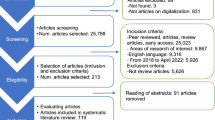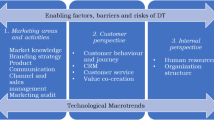Abstract
This interpretive study of change in Australian book publishing, included a survey of book publishers and the conduct of 14 case studies in five categories of publisher: general trade, academic, professional, specialist and university. This paper reports in detail on the experience on one general trade publisher as it sought to face the challenges of globalization and of organizational and technological change. The major finding was that digitization is indeed, impacting on business models for book publishing, with current models comprising something of a hybrid between the traditional and the innovative. Reflecting the presence in Australia of similar trends and issues that are affecting book publishing around the world, the findings are of relevance both to book publishers and to researchers. The work is original in that relatively little recent academic research has been conducted into book publishing in Australia, particularly as regards the implications of digitization for business models.







Similar content being viewed by others
References
Osterwalder A. The business model ontology a proposition in a design science approach. Doctoral thesis, University of Lausanne, Lausanne, Switzerland; 2004.
Liu ML, Rao BH. Operational concepts and changes of academic journals in the digital age. Chongqing University Press; 2005. Available at www.cqvip.com/tq/tb04-6.htm. Accessed Jan 2007.
Daniels M. Brave new world, digitisation of content: the opportunities for booksellers and the booksellers association. London: Booksellers Association; 2006.
Bagchi S, Tulskie B. E-business models: integrating learning from strategy development experiences and empirical Research. Paper presented to the 20th annual international conference of the strategic management society, Vancouver. 2000. October pp. 15–8.
Akkermans H. Intelligent e-business: from technology to value. IEEE Intell Syst. 2001;16(4):8–10.
Jansen W, et al. New business models for the knowledge economy. England: Gower Publishing Limited; 2007.
Weill P, Vitale M. Place to space: migrating to e-business models. Boston: Harvard Business School Press; 2001.
Thompson JB. Books in the digital age. Cambridge: Polity Press Ltd.; 2005.
Cheng SG. Modern publishing industry structures and business models. 2004. China.com.cn. Available at www.china.org.cn/chinese/zhauanti/2004whbg/504236.htm. Accessed Feb 2007.
Encyclopaedia of Global Industries. IEEE intelligent systems. Vol. 16, No. 4, 3rd ed. Framingham: Thompson Gale; 2003. pp. 1–17.
DTI (Department of Trade and Industry). E-commerce: business opportunities for publishers. Leatherhead: Department of Trade and Industry; 2002.
Datamonitor. Publishing is Asia–Pacific: industry profile. Rockville: MarketResearch.Com; 2006. www.datamontior.com.
Ibis World Industry Report. Book and other publishing in Australia. Sydney: Ibis World Pty.; 2009.
Ibis World Industry Report. Book and other publishing in Australia. Sydney: Ibis World Pty.; 2008.
Keh HT. Evolution of the book publishing industry: structural changes and strategic implications. J Manag Hist. 1998;4(2):104–23.
Greco AN. The market for consumer books in the U.S.: 1984–1995. London: Lawrence Erlbaum Associates; 2005.
Hughes JA, Sharrock WW. The philosophy of social research. 3rd ed. London: Longman; 1997.
Litwin MS. How to measure survey reliability and validity. London: Sage; 1995.
Yin RK. Enhancing the quality of case studies in health services research. Health Serv Res. 1999;34(5):1209–24.
Molla A, Heeks R, Balcells I. Adding clicks to bricks: a case study of e-commerce adoption by a small Catalan retailer. Eur J Inf Syst. 2006;15:424–38.
Lawrence E, Lawrence J, Newton S, Dann S, Corbitt B, Thanasankit T. Internet commerce digital models for business. 3rd ed. Milton: Wiley; 2003.
Afuah A, Tucci CL. Internet business models and strategies: text and cases. New York: McGraw-Hill Higher Education; 2003.
Chesbrough H, Rosenbloom RS. The role of the business model in capturing value from innovation: evidence from xerox corporation’s technology spinoff companies. Ind Corp Chang. 2002;11(3):529–55.
Gordijn J, Akkermans J, Vliet JV. Designing and evaluating e-business models. IEEE Intell Syst. 2001;16(4):11–7.
Hamel G. Leading the revolution. Boston: Harvard Business School Press; 2000.
Linder J, Cantrell S. Changing business models: surveying the landscape. Chicago: Accenture Institute for Strategic Change; 2000.
Osterwalder A, Pigneur Y, Tucci CL. Clarifying business models: origins present and future of the concept. Commun ACM. 2005;15:1–43.
Petrovic O, Kittle C. “Developing business models for e-commerce”, international conference on e-commerce, Vienna. 2001. Available at www.evolaris.net/index_en.php/article view/35/1/59. Accessed Aug 2006.
Applegate LM. E-business models: making sense of the internet business landscape. In: Dickson G, Gary W, DeSanctis G, editors. Information technology and the future enterprise: new models for managers. Upper Saddle River: Prentice Hall; 2001.
Rappa M. Managing the digital enterprise: business models on the web. Raleigh: North Carolina State University Press; 2001.
Betz F. Strategic business models. Eng Manag J. 2002;14(1):21–7.
Afuah A, Tucci CL. Internet business models and strategies. Boston: McGraw Hill; 2001.
Rappa M. Business models on the web. 2006. http://digitalenterprise.org/models/models.pdf. Accessed Dec 2006.
Timmers P. Business models for electronic markets. CommerceNet. 1998;8(2):3–8.
Duboisson-Torbay M, Osterwalder A, Pigneur Y. E-business model design, classification and measurement. Thunderbird Int Bus Rev. 2002;44(1):5–23.
Whiteley D. E-commerce: strategy, technologies and applications. Maidenhead: McGraw-Hill; 2000.
Elliot S. Electronic commerce: B2C strategies and models. Chichester: Prentice Hall; 2002.
Hawkins R. The phantom of the marketplace: searching for new e-commerce business models. Commun Strateg. 2002;46(2):297–329.
Turban E, King D, Lee J, Warkentin M, Chung M. Electronic commerce: a managerial perspective. International edition. Englewood Cliffs: Prentice Hall; 2002.
Krishnamurthy S. E-commerce management: texts and cases. London: Thompson Learning; 2003.
Kinder T. Emerging e-commerce business models: an analysis of case studies from West Lothian, Scotland. Eur J Innov Manag. 2002;5(3):130–51.
Hagel J. Out of the box: strategies for achieving profits today and growth tomorrow. Boston: Harvard Business School Press; 2002.
Laudon KC, Traver CG. E-Commerce: business, technology, society. 4th ed. Upper Saddle River: Pearson Prentice Hall; 2008.
Author information
Authors and Affiliations
Corresponding author
Rights and permissions
About this article
Cite this article
Tian, X., Martin, B. Business Models in Digital Book Publishing: Some Insights from Australia. Pub Res Q 25, 73–88 (2009). https://doi.org/10.1007/s12109-009-9115-1
Published:
Issue Date:
DOI: https://doi.org/10.1007/s12109-009-9115-1




